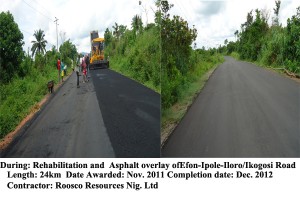That ‘Ekiti roads are naturally tarred’ is the derogatory way of describing the bumpy and generally dilapidated state of the roads. It was, therefore, no surprise that the need for development was the loudest of the calls during the agitation for the creation of Ekiti State which eventually came into being on 1, October 1996.
16 years after, the roads in question are still begging for answer as records and simple eyewitness account show that the best and most durable roads of the few in Ekiti State were constructed during the tenure of Chief Adeniyi Adebayo as governor between 1999 and 2003.
An integrated rural development approach was, therefore, conceived as an answer by the Kayode Fayemi-Ied government to improve the road networks and make all parts of Ekiti State accessible by 2014. The state government, the Ministry of Local Government and Community Development, in collaboration with the 16 council areas, are engaged in construction of five kilometres of township roads per local government area. This adds up to 80 kilometer of roads to be constructed all together in the first year of this programme.
Consequently, the state government appointed a reputable engineering firm at its own expense to work with the local government councils to identify, design, cost and provide all other technical inputs alongside with the state Bureau of Public Procurement.
To engender community participation and ownership, each local government area selected three contractors to bid for the five kilometre roads project. No contractor was allowed to participate in more than one local government’s bid.
In all, about 46 contractors participated at the public bidding opening ceremony which held on the 7 December, 2011, where the Commissioner for Local Government and Community Development, Chief Dayo Fadipe, explained that it would be a joint project between the state government and each local government. The total project cost was N5, 387,246,228.37 out of which the state government would contribute NI, 396,811,554.28 representing 25 per cent and and the cost of hiring a consultant.
To date, a total of NI , 950,070,452.21 has been paid to various contractors by the 16 local governments. Project account has been opened by each local government, with a view to ensuring that people get value for their money. Each contractor was also given the mandate to employ artisans and unskilled labour within the host community as an employment generation mechanism.
Contractors also agreed to stage-by-the stage payment, as work progresses, after being certified by consultants. This is to avoid site abandonment and poor job execution which was the bane of past projects.
Monitoring groups were also put in place through local government engineers, host community groups and professional consultants to guarantee quality delivery, while Governor Kayode Fayemi, through his mobile quarterly local government interactive session where each caretaker chairman renders a public stewardship, provided an ample opportunity for an unbiased on-the-spot assessment.
Ahead of the September deadline, most contractors have been working round the clock to ensure delivery as revealed through recent inspection visit by the deputy governor, Mrs. Funmilayo Olayinka, and Chief Fadipe with line drains and culverts constructed and fillings carried out in preparation for asphalt overlay.
In communities like Ijero, Ikere, Odo-Oro and Emure, asphalt work has commenced. The multiplier effect of this integrated rural development model, which has no parallel in the history of Ekiti State, cannot be quantified in the alleviation of poverty, promotion of commerce, transportation of agricultural products from hinterland to the city as well as providing the much-needed enabling environment for public-private partnerships to spring forth.
This, according to the deputy governor, is under phase one as government is in a hurry to begin the Phase Two of another set of five-kilometre road project across the 16 local government areas as soon as the Phase One is delivered.
It, therefore, makes a good imagination of what rural roads of Ekiti will be by 2014 when about 240 kilometres would have been constructed under a total quality management to give Ekiti a trul rural development model.
Agunsimi writes from the Ministry of Local Government and Community Development, Ado-Ekiti.
Last modified: September 21, 2012

